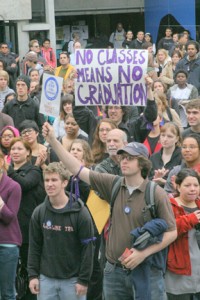Cuts, Cuts, Cuts: State proposes more cuts to education, hundreds protest

By Lauren Tyler
Staff Writer
A few hundred San Francisco State University students gathered on their campus on Nov. 12 to protest proposed budget cuts to the California State University system.
SFSU students were in an uproar because the university has proposed to move early registration dates back and eliminate many upper division courses.
“I may not be able to graduate with the classes that may be cut,” said Colin Cahill, a third year anthropology student, stating a common fear of SFSU students.
Katrina Perigo, also a SFSU student, said with an additional $61 million in possible cuts to the annual budget, the budget will “leave no upper level segment three courses,” which are required to graduate.
“We are just holding our breath,” said City College Vice Chancellor of Finance Peter Goldstein at the Sept. 26 board of trustee’s meeting about the state’s tumultuous impact on City College’s budget, though from the information provided by the state last month Goldstein said, “we do have a balanced budget.”
The Community College League released an updated budget on Nov. 11, which said the Legislative Analyst’s Office has proposed community colleges receive a reduced reimbursement rate for non-credit classes. Also, the analyst proposed that community colleges should raise the tuition rate from $20 per unit to $26 per unit starting on Jan. 1, 2009 and increase it to $30 per unit on July 1, 2009.
Community colleges are expected to lose $290 million from the lack of reimbursement. In addition, “colleges would not be able to keep the $120 million from increased rates,” said the LAO.
City College has approximately “$200 million in operating expenses annually,” Goldstein said. There is a sufficient amount “of resources to cover that with a small surplus,” this semester and to protect the school from upcoming cuts, according to Goldstein.
Preventative measures were also taken to protect City College from mid-year cuts. The college has held back on counting on some of the “If we [the college’s revenue] get adjusted downward by $2.7 million, then we don’t have to dip into our reserves,” said Goldstein, referring to the college’s budget, was built upon higher revenue than the current expected state income.
The legislature’s delay in coming to an agreement on next year’s budget made deciding on City College’s 2008-2009 budget a difficult task. The college had not received funding checks from the state for three months, hence the budget was overdue. The college began receiving checks again in mid-October.
According to John Bilmont, City College’s Chief Financial Officer, City College used approximately $25 million over the three month period in day-to-day costs before receiving any checks from the state. In addition, there was also a surplus from the last budget year. City College in the end “checked out” with $2.9 million surplus, but this amount would not even cover two weeks of the college’s payroll, which is approximately $7 million, said Goldstein.
According to Goldstein, City College borrowed money from the City and County of San Francisco to cover funding during the first three months of the 2008-2009 fiscal year, with the option to borrow up to $40 million. City College is now paying three percent interest to the city on the money that it borrowed, as it had no other choice without state assistance.
“[City College] had to borrow more than ever, and it will cost us more than ever,” Goldstein said.
A few pivotal steps were taken to decrease spending during the planning of the present budget. City College reduced its reliance on outside consultants thus saving hundreds of thousands of dollars and has left vacant classified positions unfilled, according to Goldstein.
Taxes and cuts are the big issues at hand for balancing the 2009-2010 California state budget. In a Oct. 29 Los Angeles Times article, the governor told education leaders in a private meeting to expect an additional cut of $2-4 billion “to close the state’s yawning budget gap.”
In the article, Kevin Gordon, a lobbyist representing hundreds of the state’s school districts said “they put together a budget with fake numbers … I don’t know how schools would keep their doors open with cuts of this magnitude.”
At the end of the day, the chancellor’s philosophy is to protect the students, Goldstein said. “To ensure there is no change to the cost of tuition and the abundance of programs offered at City College.”
If the worst-case scenario does happen and there are mid-year cuts, the college’s budget may have to be revisited in January 2009, Goldstein said.

Comments are closed.